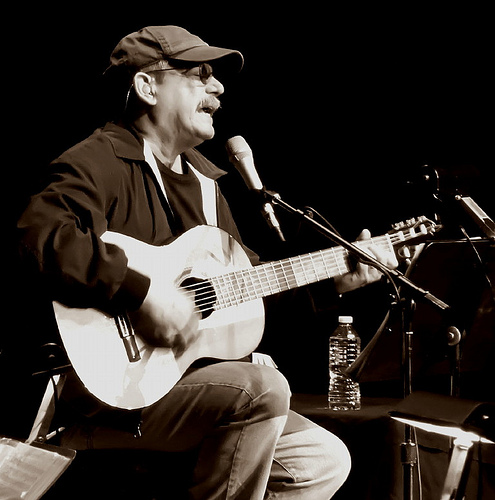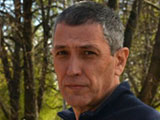The Unicorn Ended Up Insulting Silvio
by Israel Centeno / July 2, 2014 / No comments
A few stories about Silvio Rodríguez , captain of the nueva trova movement.

Silvio Rodríguez. Photo: Matthew Straubmuller via Flickr
“todos los años yo llego a mi casa,
y salgo a ti”
“every year I come home,
and I go to you”
I have an interesting after-dinner anecdote about the Cuban musicians Silvio Rodríguez and Pablo Milanés from their 1981 concert in Barcelona’s Camp Nou stadium. I remember that night like the materialization of a heavy punch.

- From his lonely watch post Albert Camus asked who among us has not experienced exile yet still managed to preserve a spark of fire in their soul. “We’re all alone,” Natalia Sedova cried in exile on hearing of her husband Leon Trotsky’s affair with Frida Kahlo. In his novel Night Watch, Stephen Koch follows the incestuous love affair of David and Harriet, wealthy siblings watching the world from their solitary exile. Koch’s writing, Camus’s theories, and Trotsky’s affair all come back to exile and lead me to reflect on the human condition. From my own vantage point, my Night Watch, I will reflect on my questions of exile, writing, and the human condition.

- Israel Centeno was born in 1958 in Caracas, Venezuela, and currently lives in Pittsburgh as a Writer-in-Residence with City of Asylum/Pittsburgh. He writes both novels and short stories, and also works as an editor and professor of literature. He has published nine books in Venezuela and three in Spain.
Back in 1981 I was very young and disillusioned by a lot of things, as I had just had my first experience with political fanaticism. I was disrespectful and unbelieving, probably, yet I still wanted to preserve some abstractions, some hopes, because I knew that the world couldn’t have suddenly become this grey landscape with few alternatives, couldn’t have just transformed into some pragmatic dump, some complex and unscrupulous political reality in which everything transcended heaven and hell. Consequently, despite my ideological rejections and fractures, I insisted on believing that I could find solace in the lyrics of the Cuban nueva trova songs, the pleasant land of a better world. Notwithstanding their indulgence in clichés and a kind of corniness created purely for a trendy intelligentsia who wanted more than just trenches, I loved them. For this reason, I bought my ticket to the concert at Camp Nou and sat in the stands, yelling out song titles and, once the concert was over, decided I would go up to the stage, break through the security barriers, and get autographs from the two symbols of the new protest music.
To cut a long story short, after conquering an almost impenetrable wall of bodyguards, amateur boxers, and security personnel, I reached the singers. Pablo, paying little attention to me, signed the cover of the book I offered him. However, Silvio noted the title and the name of the author, Mario Vargas Llosa (I didn’t bring this book for any reason in particular; it was simply the one I had on hand for an autograph). He then took the book and, with a look of contempt, asked me where I was from. I told him I was from Venezuela, and he immediately expressed his disapproval of Vargas Llosa using slang from my country.
“I’m not signing a book by that bastard.”
“But why?” I asked.
Though I knew Vargas Llosa had declared his opposition to the Cuban revolution, I never thought that the troubadour would refuse to sign the cover of La ciudad y los perros. He turned his back on me when I kept asking questions.
“Didn’t you enjoy this book? What does this book have to do with—?”
The stage lights went off, I heard voices, and a fist connected with my eye. With his back turned, Silvio continued talking to his musicians, or maybe just the ether.
Years passed and Silvio came to Caracas. He visited during the second presidency of Carlos Andrés Pérez, whom Fidel considered one of his closest friends and best allies (remember that the Soviet Union no longer existed at this time). Despite the military coups attempted by Hugo Chávez, this friendship seemed loyal and unshakeable. Eternal, even.
This time Silvio was performing a concert in Caracas, without Pablo Milanés or any of the other nueva trova musicians. He was the star. This time I wasn’t in the audience, just a passer-by walking home from work along Avenida Principal de Las Mercedes. The street was packed, with many people sitting in the trees and on top of news-stands, singing along to Silvio’s songs under a cloudless sky. And then he did it again, right when everyone was singing a verse of “La Canción del Elegido”: The star of the Cuban revolution simply turned his back on them. It was all a metaphor. Scornfully, I left the people singing together and went home.
Not long ago, I read a press release for Silvio Rodríguez, whose novelty has now worn off—“El Tiempo,” “El Implacable,” “El Que Pasó” (this was by Pablo). The press photo pictured someone who could’ve been a pencil-pusher at a bankrupt sugar factory. A gloomy civil servant for a ruined trade.
Silvio Rodríguez, flung from his dream about snakes.
The release included an un-minstrel-like statement from the singer and member of the Communist party: “Many Cubans believed that progress would come with communism. When I sang ‘te convido a creerme cuando digo futuro’ (I invite you to believe me when I say ‘the future’), I didn’t think that this would be the future. I thought the future was going to be different.”
Just then I remembered that punch in the eye in Barcelona. Although the man who always acted as captain of the nueva trova movement denies it, he insists on turning his back on the public, making fun of them like always. He doesn’t hide his cynicism and with little effort he declares his disenchantment for a corazón partido por la era (a heart born to an age), a son, desangrado son, corazón (a sound, a bleeding sound, sweetheart), although he continues singing the lyrics to himself:
“todos los años yo llego a mi casa,
y salgo a ti,
como si tú fueras el comunismo,
y salgo a ti”
“every year I come home,
and I go to you,
as if you were communism,
and I go to you”
Yes, every year, Silvio, every year. And it’s only now that you realize the melancholy that has overwhelmed Cuba was fired by the gun of the future. Bastard.




